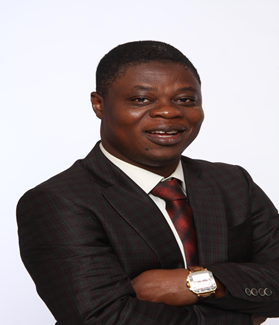Complexity Is a Fact of Life and Projects
Interview with Prof Lavagnon Ika
Professor of Project Management
Founding Director, Major Project Observatory
Tefler School of Management, University of Ottawa
Ottawa, Ontario, Canada

Interviewed by Yu Yanjuan
Journalist, Project Management Review: PMR (China)
International Correspondent, PM World Journal
Introduction to the interviewee
Lavagnon Ika is Full Professor of Project Management (PM), Founding Director of the Major Projects Observatory, and former MSc Program Director at the Telfer School of Management (Ottawa). He holds an MSc and a PhD in PM from the Université du Québec.
Over the past 20 years, he has taught PM in both the French and English languages, in Canada, Europe, Africa, and the Middle East. He has supervised or advised more than 50 students and sat on many MSc and PhD committees all over the world.
Prof. Ika’s research focuses on ‘how projects work’, particularly in the Global South. He takes a great pride in studying global development projects. He looks into project success and failure, cost overruns and benefit shortfalls, complexity and project behavior (or misbehavior). He is the author of some 50 papers in peer-reviewed journals. His co-authored book on managing fuzzy projects in 3D is slated to be published in 2022 by McGraw-Hill.
He is Associate Editor for the International Journal of Project Management (IJPM), a member of the PMI Insights Academic Team, the IPMA Research Group, the International Journal of Managing Projects in Business (IJMPiB) editorial board, and of the Editorial Review Board of the Journal of African Business (JAB). His works have been funded by granting agencies such as SSHRC and FRQSC.
His efforts have been rewarded by awards such as the IPMA Research Award in 2017, the IPMA Contribution of a Young Researcher Award in 2012, IJMPiB Best Paper Award in 2017, and the Telfer’s Established Researcher Award in 2021 and Innovative Researcher Award in 2017.
As a professor in project management, he enjoys learning. As he once put it, “I teach, so to learn.” He said, “I am particularly lucky to be teaching in the project management field at the frontier between theory and practice that requires “complex types of inquiry” to tackle complex and world-scale challenges such as global poverty in Africa and climate change, perhaps for the greater good.”
Interview
Part Ⅰ Project Complexity
Q1. What are the factors that lead to complexity in project management?
Lavagnon Ika (Ika): Complexity is a fact of life. There is no escape. Think about the coronavirus pandemic and how it has upended our lives. Who would think that even after more than one year we’ll still be struggling with this invisible, tiny but so powerful virus? So, you’d understand that complexity is part and parcel of projects, which are akin to a bet on the future.
While a myriad of factors can lead to complexity in projects, I would suggest that by and large they relate to three aspects: the intrinsic complexity of the project, the socio-political complexity of the setting, and the emergent complexity (or uncertainty) or the extent to which there are changes in the other two aspects over time. Take, for example, the Belt and Road Initiative and the vaccination rollout. They are complex projects which hold intangible, unclear or instable goals and/or take place in socio-politically complex contexts. My co-author and I call these types of initiatives “fuzzy projects” in our upcoming book at McGraw Hill next year.
Q2. What are your tips on dealing with complexity in project management?
Ika: It has been suggested that 80% of the complexity of a project lies in intrinsic and socio-political aspects, and 20% in its emerging aspect. So, we should address these three aspects if we are to be successful. A sound project management plan is a good start to tame intrinsic complexity. Good context assessment and stakeholder engagement can help with socio-political complexity. A realistic risk management plan can help anticipate both welcome and unwelcome surprises and thus confront emerging complexity.
However, I would suggest a good response to complexity depends on the project type. Take iPhone 12 as a small product change project. The traditional “understand-reduce-respond” attitude to complexity might work as a good recipe. But it could fall short for the more complex projects such as iPhone 1 (a breakthrough) which need more creativity, experimentation, and iteration for their delivery. For these breakthrough projects, an “understand-embrace-adapt” attitude to complexity is more suitable, as the tip is to embrace, not reduce complexity. As you know, this latter attitude has proven more effective in dealing with the pandemic (e.g., economic and health responses by governments) and the mass vaccination (e.g., learning and adjusting to the emergence of variants for both vaccine development and vaccination rollout).
Part Ⅱ Project Failure and Success
Q3. Based on your observation, why do mega-projects fail? What are the common reasons?
More…
To read entire interview, click here
Editor’s note: This interview was first published in PMR, Project Management Review magazine, China. It is republished here with the permission of PMR. The PM World Journal maintains a cooperative relationship with PMR, periodically republishing works from each other’s publications. To see the original interview with Chinese introduction, visit PMR at http://www.pmreview.com.cn/english/
How to cite this interview: PMR (2021). Complexity Is a Fact of Life and Projects: Interview with Prof Lavagnon Ika; Project Management Review; republished in the PM World Journal, Vol. X, Issue VII, July. Available online at https://pmworldlibrary.net/wp-content/uploads/2021/07/pmwj107-Jul2021-Yanjuan-Prof-Lavagnon-Ika-Interview.pdf
About the Interviewer

Yu Yanjuan
Beijing, China
![]()
Yu Yanjuan (English name: Spring), Bachelor’s Degree, graduated from the English Department of Beijing International Studies University (BISU) in China. She is now an English-language journalist and editor working for Project Management Review (PMR) Magazine and website. She has interviewed over sixty top experts in the field of project management. Before joining PMR, she once worked as a journalist and editor for other media platforms in China. She has also worked part-time as an English teacher in training centers in Beijing. Beginning in January 2020, Spring also serves as an international correspondent for the PM World Journal.
For work contact, she can be reached via email yuyanjuan2005@163.com or LinkedIn https://www.linkedin.com/in/yanjuanyu-76b280151/.
To view other works by Spring, visit her author showcase in the PM World Library at https://pmworldlibrary.net/authors/yu-yanjuan/









